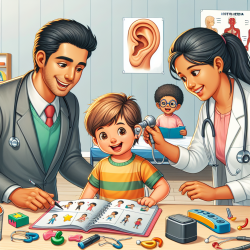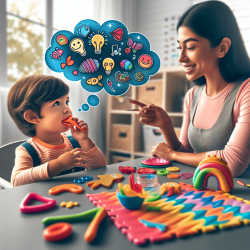The relationship between early childhood hearing and subsequent language development is a critical area of focus for educators, speech therapists, and special education professionals. A significant study, "Language Development in Children with Mild Conductive Hearing Losses," conducted at the Montreal Children's Hospital, sheds light on the impact of recurrent otitis media (middle ear infections) on language acquisition and development in preschool children. This research provides invaluable insights for practitioners aiming to support children with similar profiles in their educational settings.
Recurrent otitis media is a common childhood condition characterized by repeated episodes of middle ear infections, which can lead to mild conductive hearing losses. The study investigated the possible link between these hearing losses and language development in children aged 3-6 to 5-6 years. Through meticulous audiological and language assessments, the research revealed significant findings that can guide practitioners in enhancing the speech and language outcomes for children affected by this condition.
Key Findings:
- Children with mild conductive hearing losses demonstrated significant differences in language measures compared to their peers without hearing issues.
- While the experimental group did not present as severely language delayed, expressive language skills, in particular, were notably affected.
- The study suggests an association between early recurrent otitis media and delays in phonology, although the children's language skills appeared relatively age-appropriate on receptive measures.
Implications for Practice:
- Early Identification and Monitoring: The study underscores the importance of early identification and continuous monitoring of children with recurrent otitis media. Practitioners should advocate for regular audiological assessments to detect any changes in hearing that could affect language development.
- Targeted Intervention Strategies: Based on the study's findings, speech and language interventions should particularly focus on enhancing expressive language skills and phonological development. Tailored strategies that address these areas can help mitigate the potential impacts of mild conductive hearing losses on language acquisition.
- Collaborative Approach: Collaboration between educators, speech therapists, audiologists, and parents is crucial. Sharing insights and strategies across disciplines can ensure a comprehensive support system tailored to each child's unique needs.
- Further Research and Professional Development: The study highlights the need for ongoing research to fully understand the ramifications of mild conductive hearing losses on language development. Practitioners should engage in continuous professional development and stay abreast of current research findings to refine their approaches and interventions.
The insights from this study are a valuable resource for practitioners working with children experiencing mild conductive hearing losses due to recurrent otitis media. By implementing targeted interventions and adopting a collaborative, informed approach, it is possible to support these children in overcoming potential language development challenges and achieving their full communicative potential.
To enhance your practice and learn more about the specifics of this research, including the methodology and detailed findings, Language Development in Children with Mild Conductive Hearing Losses.










